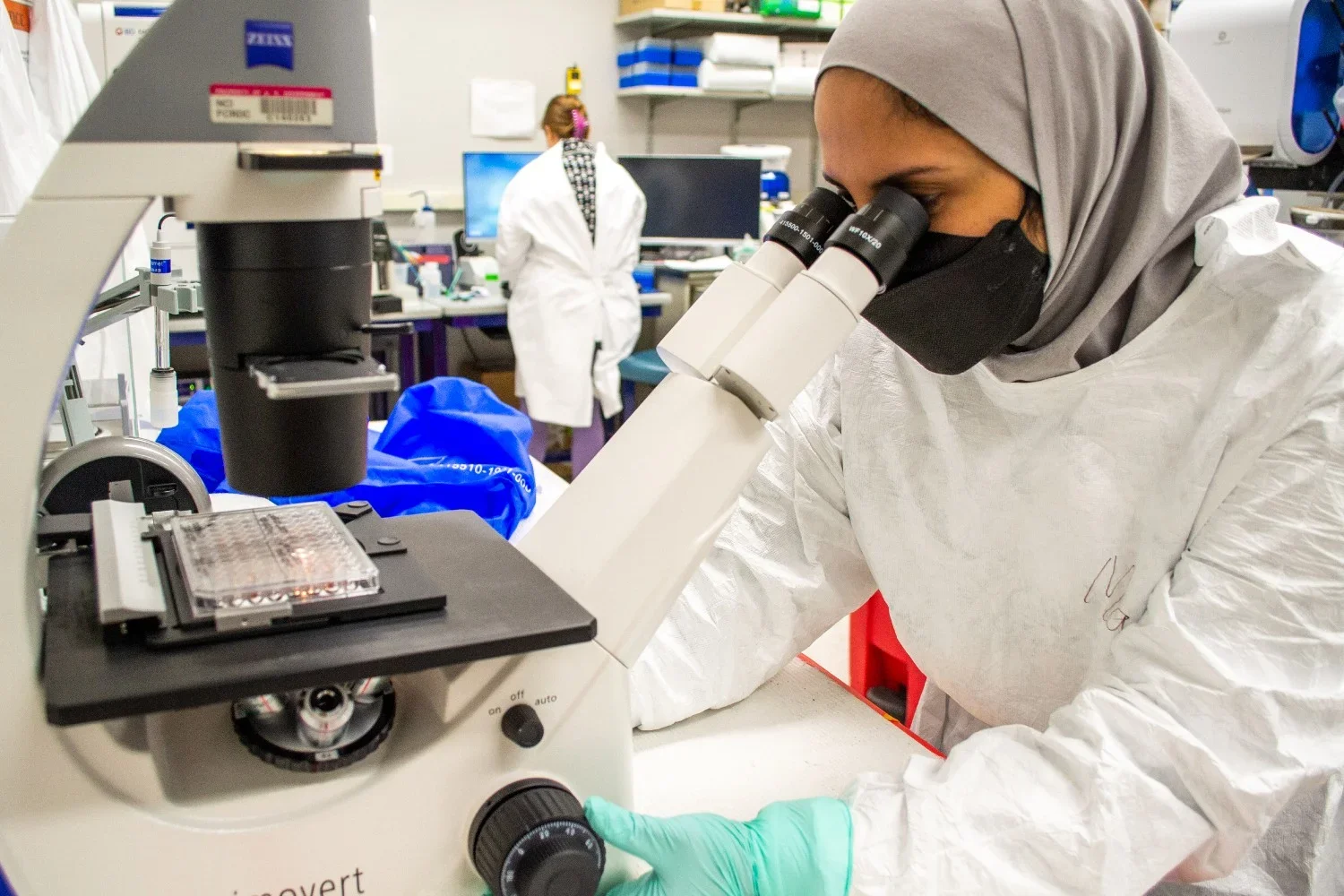Highly motivated Georgetown B.S. in Human Science students can complete the requirements for the M.S. in Biohazardous Threat Agents & Emerging Infectious Diseases in one semester after completing the bachelor’s program.
The Master of Science in Biohazardous Threat Agents & Emerging Infectious Diseases program provides students with a solid foundation in the concepts of biological risk, disease threat, and mitigation strategies. The curriculum covers classic biological threats agents, global health security, emerging diseases, technologies, CBRN risk mitigation, and CBRN security. Graduates of our program are employed in both public health and security-focused positions across government and private sector organizations.
The master’s program can be taken as an M.S. with Concentration in Biomedical Science Policy & Advocacy (BSPA), which serves as a valuable introduction to the world of science policy in Washington, D.C., and beyond. This mode of the master’s program provides students with essential training in the fundamentals of science policy and allows them to gain hands-on experience applying science policy in their specific field of study.
Application
HSCI students with a minimum GPA of 3.5 in the major are eligible to apply to this program by January 15 of their junior year. Students who wish to apply should inquire with Jason Tilan, Director of Accelerated BGE Pathways, Department of Human Science.
For more information about our program and admissions, please contact us.
Timeline
Undergraduates start taking master’s courses in their senior year, earning the master’s degree in the fall after completing the Bachelor of Science.

Degree Plan
Below is the degree plan for students to complete the standard Accelerated M.S. program. Alternatively, students may choose the M.S. with Concentration in Biomedical Science Policy & Advocacy, which has its own BSPA Concentration degree plan.
Senior – Fall
| Course Name | Credit(s) |
|---|---|
| HSCI 4972 Human Science Seminar/Capstone I | 3 |
| HSCI 4510 Physiological Adaptations | 4 |
| BHTA 6515 Microbiology of Biological Threat Agents | 3 |
| Graduate Fall Elective(s) | 3 |
| 13 Credits |
Senior – Spring
| Course Name | Credit(s) |
|---|---|
| HSCI 4973 Human Science Seminar/Capstone II | 3 |
| HSCI 3090 Immunology | 3 |
| BHTA 6520 Agroterrorism | 3 |
| BHTA 6577 Defense Threat Reduction Initiatives | 2 |
| Graduate Spring Elective(s) | 3 |
| 14 Credits |
- Upon completion of the undergraduate degree requirements, you will receive your bachelor’s degree and may participate in Commencement with your undergraduate class. Contact your advising dean for more information.
- Apply for master’s graduation in your second-to-last semester. Follow the Biomedical Graduate Education Graduating Student Checklist.
Master’s – Fall
Complete the Biomedical Graduate Education Orientation at the start of the semester.
| Course Name | Credit(s) |
|---|---|
| BHTA 6517 Bioterrorism | 3 |
| BHTA 6525 Homeland Security | 3 |
| BHTA 6551 Biohazardous Threat Agents & Emerging Infectious Diseases Seminar | 2 |
| Graduate Fall Elective(s) | 8 |
| 16 Credits |
- Students pay the per-semester flat rate.
- Students may take internships as electives:
- BHTA 7950 Internship Experience (must be with an organization outside the university)
- MICB 6220 Advanced Techniques in Microbiology I (lab rotation in the Department of Microbiology & Immunology)
- Follow the Biomedical Graduate Education Graduating Student Checklist to apply for graduation and to register for Commencement the following spring if you wish to attend.
Degree Plan: BSPA Concentration
Below is the degree plan for students to complete the M.S. with Concentration in Biomedical Science Policy & Advocacy by taking three specific graduate electives.
Senior – Fall
| Course Name | Credit(s) |
|---|---|
| HSCI 4972 Human Science Seminar/Capstone I | 3 |
| HSCI 4510 Physiological Adaptations | 4 |
| BHTA 6515 Microbiology of Biological Threat Agents | 3 |
| Graduate Fall Elective(s) | 3 |
| 13 Credits |
Senior – Spring
| Course Name | Credit(s) |
|---|---|
| HSCI 4973 Human Science Seminar/Capstone II | 3 |
| HSCI 3090 Immunology | 3 |
| BHTA 6520 Agroterrorism | 3 |
| BHTA 6577 Defense Threat Reduction Initiatives | 2 |
| BHTA 7005 Science Diplomacy and World Health | 2 |
| 13 Credits |
- Upon completion of the undergraduate degree requirements, you will receive your bachelor’s degree and may participate in Commencement with your undergraduate class. Contact your advising dean for more information.
- Apply for master’s graduation in your second-to-last semester. Follow the Biomedical Graduate Education Graduating Student Checklist.
Master’s – Fall
Complete the Biomedical Graduate Education Orientation at the start of the semester.
| Course Name | Credit(s) |
|---|---|
| BHTA 6517 Bioterrorism | 3 |
| BHTA 6525 Homeland Security | 3 |
| BHTA 6551 Biohazardous Threat Agents & Emerging Infectious Diseases Seminar | 2 |
| BHTA 6603 Science & Technology in the Global Arena | 4 |
| BSPA 7906 Capstone Project | 3 |
| Graduate Fall Elective(s) | 2 |
| 17 Credits |
- Students pay the per-semester flat rate.
- Students may take internships as electives:
- BHTA 7950 Internship Experience (must be with an organization outside the university)
- MICB 6220 Advanced Techniques in Microbiology I (lab rotation in the Department of Microbiology & Immunology)
- Follow the Biomedical Graduate Education Graduating Student Checklist to apply for graduation and to register for Commencement the following spring if you wish to attend.
Master’s Courses
Visit M.S. in Biohazardous Threat Agents & Emerging Infectious Diseases Degree Requirements to browse our required and elective courses.
Learn More
Accelerated Programs FAQ
Answers to questions about the accelerated program.
Program Highlights
Find out what sets our program apart in preparing students for impactful careers.
Current Students
Explore resources available to M.S. in Biohazardous Threat Agents & Emerging Infectious Diseases students.
Career Readiness
Our students benefit from the services of the Biomedical Graduate Education career office, including one-on-one advising, skills workshops, leadership programs and more.

